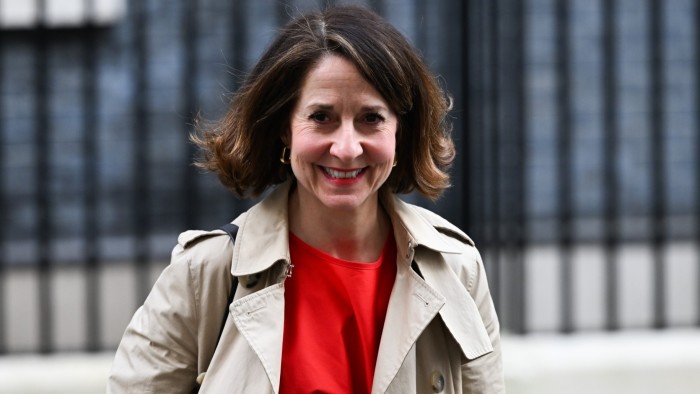Unlock the Editor’s Digest for free
Roula Khalaf, Editor of the FT, selects her favourite stories in this weekly newsletter.
Liz Kendall, work and pensions secretary, will on Monday set out details of the government’s £3bn climbdown on welfare reform, as ministers race to curtail a rebellion by Labour MPs.
Kendall will give a statement to the House of Commons on Monday ahead of a key vote on the welfare bill on Tuesday, with dozens of Labour MPs still weighing whether to back the legislation.
Her statement comes alongside a written statement by Sir Stephen Timms, disabilities minister, setting out the terms of reference for a comprehensive review of benefits known as personal independence payments.
Baroness Jacqui Smith, skills minister, was on Monday sent out to defend the government’s watering down of its planned reforms, which has blown a hole in public finances and eroded the authority of Prime Minister Sir Keir Starmer.
“What I think is important is what we’re going to be starting tomorrow is really important reform of a broken welfare system,” she told the BBC.
“Welfare reform is always difficult and I think actually the engagement that’s happened with Labour MPs, who are rightly bringing the concerns of their constituents about how this reform is going to work, have made this legislation better.”
Health secretary Wes Streeting said on Sunday the government was “in a better position” after watering down its disability benefit reforms, but stopped short of saying it was confident it had the numbers after more than 120 Labour MPs threatened to rebel.
The government has a working House of Commons majority of 165, meaning about 80 Labour MPs would need to vote against the welfare bill to defeat it, depending on abstentions and assuming other parties oppose it.
The Commons vote on the bill on Tuesday has become a key test for Starmer as he approaches the first anniversary of his time in office.
The government’s changes to the bill — including promising not to take personal independent payments away from people already receiving them — were seen as a significant U-turn.
Critics have said the concessions risk creating a “two-tier” welfare system where people who become disabled after the reforms take effect could lose out.
Starmer has argued the reforms are essential to stop the welfare budget spiralling ever higher, but the changes will reduce the savings for the government from almost £5bn to about £2bn.
Combined with a previous U-turn on winter fuel payments for pensioners, chancellor Rachel Reeves has been left with a £4.25bn hole in her budget.
The Treasury has said the hole will not be filled by “permanent” borrowing and will set out how it will be funded in the autumn Budget, prompting critics to warn Reeves will need to increase taxes.
A number of Labour rebels said they were now prepared to back the welfare bill but dozens are understood to be holding out.
A Downing Street spokesperson declined to say if the government was “quietly confident” about winning the vote, but highlighted that a number of leading rebels had agreed to support the government after the concessions.
Timms’ review of the assessment process for personal independence payments will take input from people with disabilities, relevant charities and MPs.
The government will also introduce “right to try” legislation that means people coming off disability benefits to start a new job will not automatically lose the state support, in case the job does not work out.
Changing the actual text of the welfare bill at this stage is not possible, so MPs are being asked to take the ministerial statement as a promise that changes will be enacted later.
Paula Barker, the Labour MP for Liverpool Wavertree who helped organise the rebellion, said that while it was “unquestionable” that a number of opponents had been won over by the government “there are still many who will still vote against”.
Louise Haigh, one of the leading Labour rebels, said she would now vote for the bill, adding that a “significant number of concessions” had been made, but she insisted the government had to learn from the crisis.


